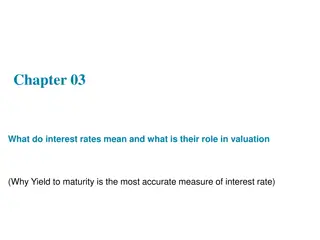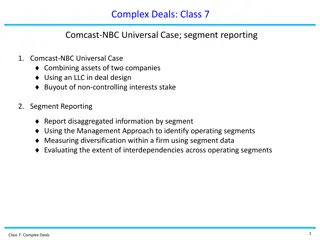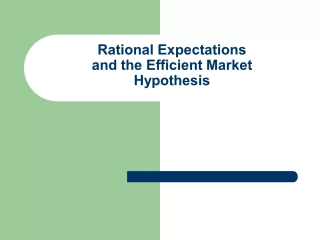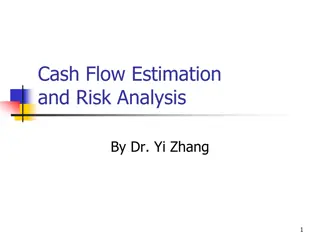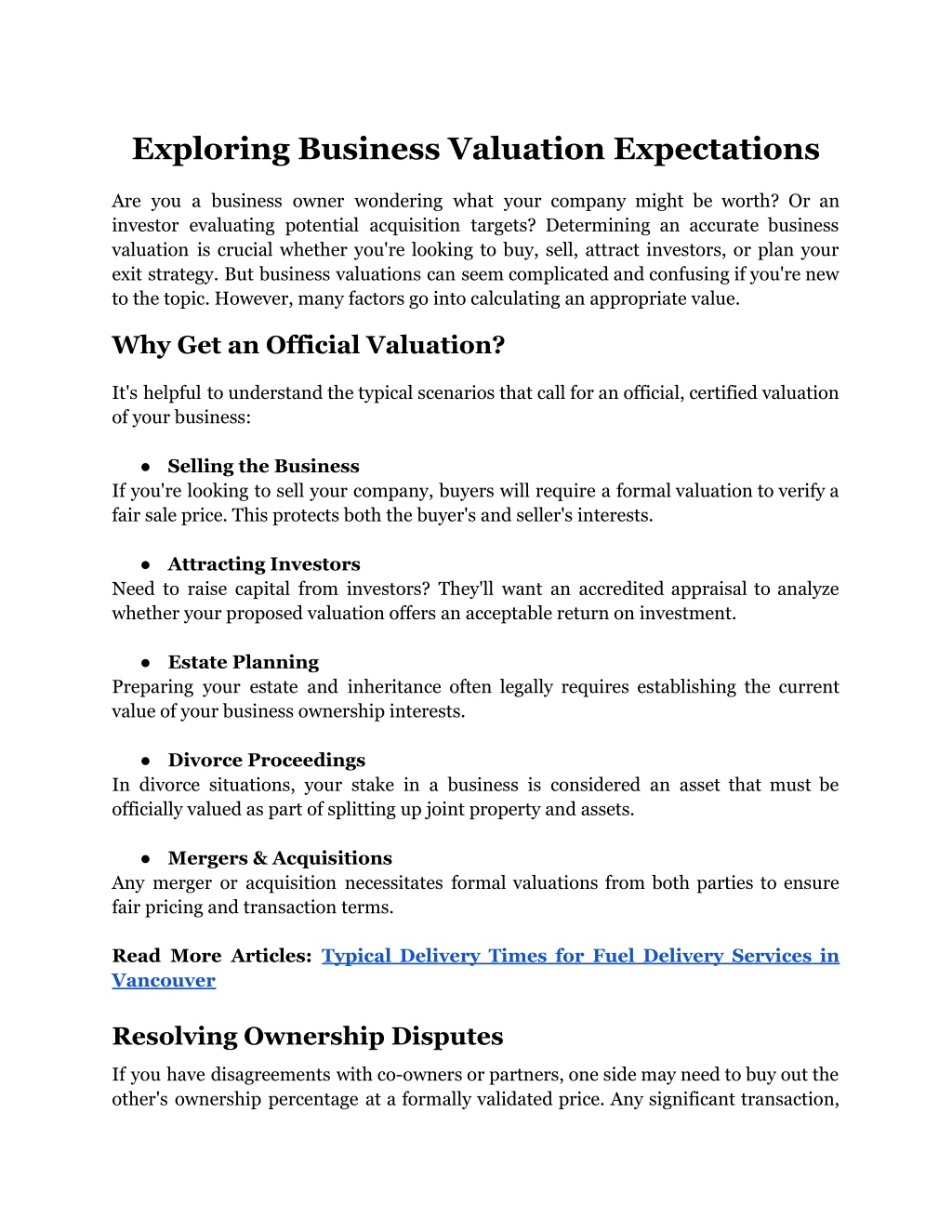
Exploring Business Valuation Expectations
This is an informal ballpark estimate or value approximation done quickly with minimalnanalysis. Business sale brokers may provide these types of rough calculations whennmarketing businesses for sale.
Download Presentation
Please find below an Image/Link to download the presentation.
The content on the website is provided AS IS for your information and personal use only. It may not be sold, licensed, or shared on other websites without obtaining consent from the author. Download presentation by click this link. If you encounter any issues during the download, it is possible that the publisher has removed the file from their server.
Presentation Transcript
Exploring Business Valuation Expectations Are you a business owner wondering what your company might be worth? Or an investor evaluating potential acquisition targets? Determining an accurate business valuation is crucial whether you're looking to buy, sell, attract investors, or plan your exit strategy. But business valuations can seem complicated and confusing if you're new to the topic. However, many factors go into calculating an appropriate value. Why Get an Official Valuation? It's helpful to understand the typical scenarios that call for an official, certified valuation of your business: Selling the Business If you're looking to sell your company, buyers will require a formal valuation to verify a fair sale price. This protects both the buyer's and seller's interests. Attracting Investors Need to raise capital from investors? They'll want an accredited appraisal to analyze whether your proposed valuation offers an acceptable return on investment. Estate Planning Preparing your estate and inheritance often legally requires establishing the current value of your business ownership interests. Divorce Proceedings In divorce situations, your stake in a business is considered an asset that must be officially valued as part of splitting up joint property and assets. Mergers & Acquisitions Any merger or acquisition necessitates formal valuations from both parties to ensure fair pricing and transaction terms. Read More Articles: Typical Delivery Times for Fuel Delivery Services in Vancouver Resolving Ownership Disputes If you have disagreements with co-owners or partners, one side may need to buy out the other's ownership percentage at a formally validated price. Any significant transaction,
legal proceeding, or change in a business's ownership structure creates the need for an accredited third party to appraise and certify its official market value. This provides a legitimate value benchmark for all stakeholders. Three Valuation Approach Buckets The process for actually calculating a business's market value follows three primary techniques or "approach buckets." Most certified valuations consider estimates and analysis within each bucket: Income Approach This method values a company based on its ability to generate income and cash flow over time. Appraisers apply standard formulas to estimate the current worth of a business's expected future profit streams. Asset-Based Approach Here, the company's value derives from analyzing its total assets and deducting any outstanding debts or liabilities. In essence, you're valuing what it owns minus what it owes. Market Approach This technique estimates a business's value by looking at recent sale prices of comparable companies within the same industry that have similar characteristics, size, financials, etc. Most formal business appraisals weigh and blend value estimates from each of these three buckets. The final certified valuation often represents an average of the different model outputs. What's Included in the Valuation? Beyond just the three calculation approaches, certified valuations take dozens of additional qualitative and quantitative factors into account, including: Business Size - Revenue, customers, employees, assets, and trajectory. Financial Performance - Profitability, revenue mix, cashflows, and debt levels. Competitive Position - Market share, advantages, growth opportunities. Management Team - Quality, experience, and depth of leadership. Potential Synergies - For strategic buyers, any gains or cost savings. Customer Risks - Customer concentration and potential defection risks. Asset Condition - State and age of equipment, facilities, vehicles, etc. Intellectual Property - Patents, trademarks, copyrights, and other IP assets.
Economic Conditions - Current interest rates, stock markets, and regulations. The more positives across these areas, the higher a company's appraised valuation will likely be. Appraisers carefully weigh each factor's potential impacts and risk profile. Rules-of-Thumb Estimates First While not formal valuations, most business owners first turn to rules-of-thumb for a general starting valuation estimate. Almost every industry has common rule-of-thumb suggestions like: For retailers, a multiple of gross revenues For manufacturers, a multiple of cash flows For services firms, a multiple of annual billings For tech companies, a multiple based on growth rates Using industry rule-of-thumb multiples gives you a quick initial benchmark or baseline value expectation. However, these offer fairly broad, surface-level estimates. The next step is conducting a comprehensive certified valuation analysis. Two Types of Valuation Work Not all business valuation reports carry the same authority or legitimacy. There are two key distinctions to be aware of: Calculation of Value This is an informal ballpark estimate or value approximation done quickly with minimal analysis. Business sale brokers may provide these types of rough calculations when marketing businesses for sale. Certified Valuation This represents a formal, fully-researched, and accredited opinion of value. It is prepared by a qualified professional valuation firm or appraiser following standard industry practices and methodologies. In official business transactions, legal situations, and high-stakes scenarios, complete certified valuations are typically required. These valuations are conducted by reputable independent valuators and serve as supporting documentation.
Behind The Valuation Calculations While not overly technical, there are a couple of core concepts you'll encounter throughout the certified valuation process relating to the income-based approaches: Capitalization Rates The cap rate represents the rate of return a buyer would likely expect to achieve on their investment in the business. Higher-risk companies demand higher cap rates, and stable businesses can support lower cap rates. Discount Rates The discount rate refers to the interest rate applied to calculate the present value of projected future cash flows. Much like cap rates, higher risk equates to higher discount rates. The specific cap rates and discount rates an appraiser uses significantly impact the ultimate income-based valuations. All else equal, the lower these rates are, the higher the overall business worth estimate. Read More Articles: A Guide to the Quirky Rado Captain Cook Dive Watch Young Companies vs. Established Businesses It's important to recognize that the valuation approach looks quite different for early-stage companies versus established businesses. Appraisals for startups and young companies tend to focus more on metrics like: Future Cash Flow Potential Market Value of Intellectual Property Comparable Startup/Seed Investments Whereas appraisals for established, profitable businesses weigh heavily on more traditional valuation indicators such as: Historical Cash Flow & Earnings Asset Values & Working Capital Public Trading Comparables The fundamental difference is that established firms with strong financials and operations can rely on standardized business valuation methodologies. However, appraisals of early-stage companies hinge more on their future growth potential and less on current performance.
Custom-Fit Valuations In certain situations, standard valuation estimates may get adjusted further via discounts or premiums to account for unique qualitative considerations: Minority Interest Discount If the ownership stake being valued represents a minority or non-controlling interest, a discount may apply compared to pricing a controlling interest. Control Premiums If a buyer establishes a controlling majority stake via acquisition, they may pay a premium above standard valuations to account for those control benefits. Liquidity Discounts For ownership interests with limited marketability or an inability to be easily sold, a liquidity discount could reduce the final certified value. Where to Sell a Business? Ultimately, a well-informed approach to valuation creates the foundation for strategic decision-making and sustainable value creation in the business. Are you ready to take the next step? At Sell My Business our team of professionals specializes in helping entrepreneurs like you to get through the complex process of selling a business with confidence. Site Article: Exploring Business Valuation Expectations




